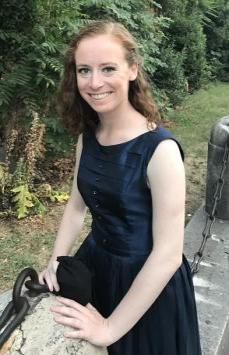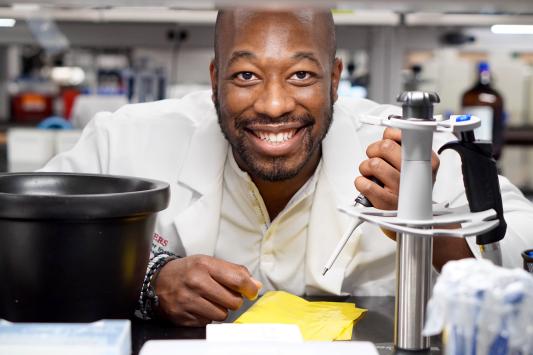Research Cafe: Hannah Federman & Eric Chiles
Event Description
Research Cafe: November 15, 2023
3:00 - 4:00 pm
The Hatchery Innovation Studio, Alexander Library
169 College Ave., New Brunswick
Zoom option available.
~Snacks & coffee provided!~
Register to attend in person or on Zoom.
1.) "Investigating the role of serotonin 2C in regulating helminth-induced inflammation" by Hannah Federman

Abstract: A growing body of literature has begun to reveal that neuropeptides and neurotransmitters can play previously unappreciated roles in both allergic and anti-parasite responses. Helminth parasites, such as hookworms, can affect several host tissues, including the lung, where they promote strong type 2 cytokine responses that support worm clearance and simultaneously initiate wound healing. Our work, and that of others, has recently identified monocyte-derived alveolar macrophages (Mo-AMs) with an alternatively activated (M2) phenotype as critical regulators of this wound healing, populating the lung in response to hookworm-induced inflammation. Further, our work has shown that Mo-AMs change phenotypically the longer they persist in the lung. Despite these advances, whether neuron-associated factors participate in this tissue imprinting process remains unknown. Interestingly, we’ve found that Mo-AMs gradually acquire high levels of the serotonin 2C receptor (5HTR2c) after entering the lung microenvironment. Serotonin is a neurotransmitter that plays important roles in myriad biological functions beyond its well described roles in the central nervous system. However, whether 5HTR2c-derived signals restrict the activation of monocyte-derived macrophages is unclear. We have now shown, both in vitro and in mice, that serotonin may operate to limit the helminth-induced macrophage response and provide additional insight into the neuron-associated factors that restrict tissue remodeling responses.
Speaker Bio: I am a 5th year PhD candidate in the parasite-immunology lab of Dr. Mark Siracusa, here at NJMS. I study the way in which serotonin and serotonin-signaling regulates macrophage activity in the lung during infection and emphysema. I'm very interested in how the body (sometimes) acts against its own best interests (like in allergic disease and autoimmunity).
2.) "Some (don’t) like it hot: How rising ocean temperatures shift metabolism within the coral holobiont" by Eric Chiles

Abstract: Coral reefs are under threat globally due to anthropogenic climate change. Understanding the relationship between the coral holobiont, the animal host and its algal and bacterial symbionts, is essential for conservation efforts. We used Liquid Chromatography coupled with Mass Spectrometry (LCMS) based metabolomics and statistical analysis tools to reveal metabolomic features correlated with prolonged heat stress. Features showing increased levels with prolonged heat stress were annotated based on accurate mass, retention time, and the MS2 spectra match to chemically synthesized pure standards. We validated several dipeptides that are significantly enriched during heat stress. This data raised questions regarding the origin of dipeptide enrichment and nitrogen metabolism in the holobiont.
In this talk I will share how we answered some of those questions by designing a controlled time course experiment with stable isotope tracing using nubbins from three species of coral, the heat tolerant Montipora capitata & Porites compressa and the heat sensitive Pocillopora acuta, all of which are endemic to the Hawaiian reef at Kaneohe Bay, Oahu. Additionally, I will also share on how tracing isotope incorporation through a metabolic pathway under different ecological conditions can inform on which host-microbial partner bears the metabolic burden and how that ultimately impacts coral survivorship outcomes under stress.
Speaker Bio: Eric N. Chiles is a 3rd year Ph.D. Candidate in the Microbial Biology program as well an alumnus from the School of Biological Sciences (SEBS) here at Rutgers University. His dissertation lies at the intersection of how microbial-host interactions are shaped by environmental context in non-model organisms and weaves together numerous scientific disciplines. A particular area of focus is the application of tools developed for biomedical research towards microbial and environmental questions. He has had the honor and pleasure of sharing his work in a number of spaces including meetings of the Metabolomic Society of North America, the American Society for Mass Spectrometry, and the International Coral Reef Society. He has also been recognized for his progress on his dissertation project by being awarded the Goyette Family Scholarship through SEBS. Eric also is an active member of the Rutgers community. He currently serves as the President of the Graduate Student Association, on the SGS DEI Student Advisory Committee, and the NB Diversity Strategic Plan Working Group. He also works as a full-time researcher at the Cancer Institute of New Jersey Metabolomics Shared Resource Lab. When he isn’t in lab he can usually be found standing over his stove, patronizing the arts, rabble-rousing for social equity, or outside soaking up some nature.
About Research Cafe
Research Café brings together the entire graduate student community of Rutgers University-New Brunswick/Piscataway campus to strengthen scholarly literacy and interdisciplinary research communication by providing a platform for budding researchers to connect, share their in-progress research or scholarship, and benefit from peer feedback in a friendly and low-stakes setting.
Research Café is a monthly, one-hour event to occur at rotating locations across the Rutgers New Brunswick/Piscataway campus (a Zoom option will be available, too). Each event will feature:
- Presentations (10-12 min. each) from two graduate students from across disciplinary areas ranging from engineering and biology to history and anthropology.
- A Q&A dialogue with peers and attendees.
- Conversational time over refreshments and snacks.
Sign up to attend in person or on Zoom at https://grad.rutgers.edu/research-cafe.
---
Questions? Contact the program coordinators:
Sonal Gahlawat at sg1389@scarletmail.rutgers.edu, Briana Bivens at bb770@grad.rutgers.edu, and Ramazan Güngör at rg835@grad.rutgers.edu.